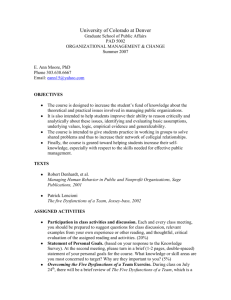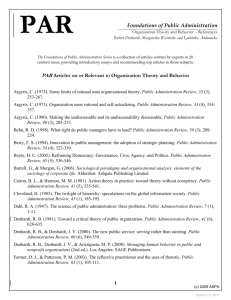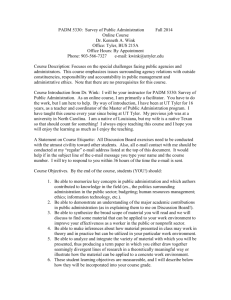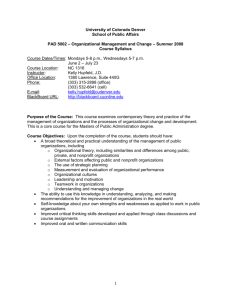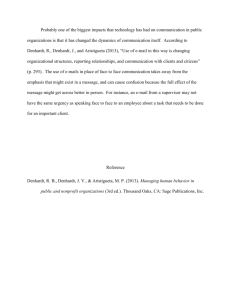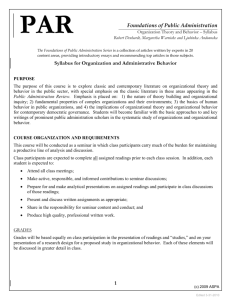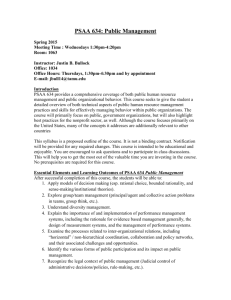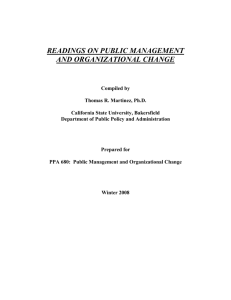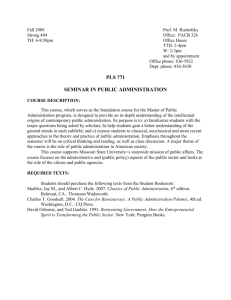The Writing Center - The University of Texas at Tyler
advertisement
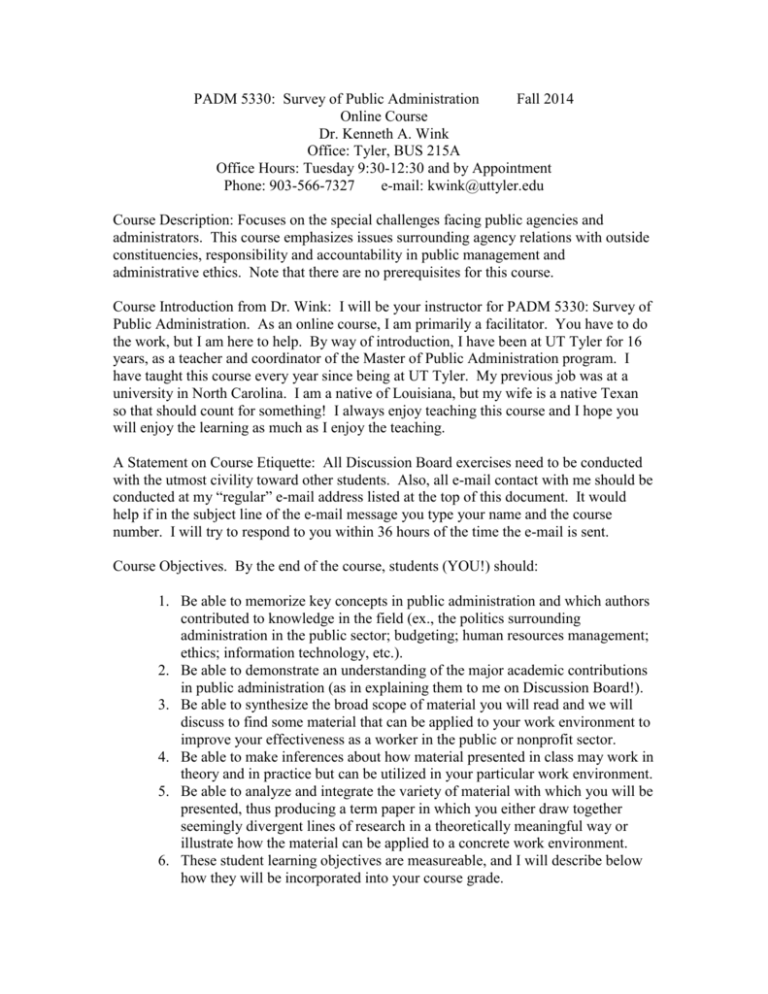
PADM 5330: Survey of Public Administration Fall 2014 Online Course Dr. Kenneth A. Wink Office: Tyler, BUS 215A Office Hours: Tuesday 9:30-12:30 and by Appointment Phone: 903-566-7327 e-mail: kwink@uttyler.edu Course Description: Focuses on the special challenges facing public agencies and administrators. This course emphasizes issues surrounding agency relations with outside constituencies, responsibility and accountability in public management and administrative ethics. Note that there are no prerequisites for this course. Course Introduction from Dr. Wink: I will be your instructor for PADM 5330: Survey of Public Administration. As an online course, I am primarily a facilitator. You have to do the work, but I am here to help. By way of introduction, I have been at UT Tyler for 16 years, as a teacher and coordinator of the Master of Public Administration program. I have taught this course every year since being at UT Tyler. My previous job was at a university in North Carolina. I am a native of Louisiana, but my wife is a native Texan so that should count for something! I always enjoy teaching this course and I hope you will enjoy the learning as much as I enjoy the teaching. A Statement on Course Etiquette: All Discussion Board exercises need to be conducted with the utmost civility toward other students. Also, all e-mail contact with me should be conducted at my “regular” e-mail address listed at the top of this document. It would help if in the subject line of the e-mail message you type your name and the course number. I will try to respond to you within 36 hours of the time the e-mail is sent. Course Objectives. By the end of the course, students (YOU!) should: 1. Be able to memorize key concepts in public administration and which authors contributed to knowledge in the field (ex., the politics surrounding administration in the public sector; budgeting; human resources management; ethics; information technology, etc.). 2. Be able to demonstrate an understanding of the major academic contributions in public administration (as in explaining them to me on Discussion Board!). 3. Be able to synthesize the broad scope of material you will read and we will discuss to find some material that can be applied to your work environment to improve your effectiveness as a worker in the public or nonprofit sector. 4. Be able to make inferences about how material presented in class may work in theory and in practice but can be utilized in your particular work environment. 5. Be able to analyze and integrate the variety of material with which you will be presented, thus producing a term paper in which you either draw together seemingly divergent lines of research in a theoretically meaningful way or illustrate how the material can be applied to a concrete work environment. 6. These student learning objectives are measureable, and I will describe below how they will be incorporated into your course grade. 2 Textbooks: 1. Robert B. Denhardt, Janet V. Denhardt, and Tara A. Blanc, Public Administration: An Action Orientation, 7th ed. Wadsworth, 2014. 2. Jay M. Shafritz, and Albert C. Hyde, Classics of Public Administration, 7th ed. Wadsworth, 2012. Grading system. Students will be evaluated on the following: 1. Preliminary work on the term paper, due in segments in the first four weeks of class. 25 points 2. A term paper that will be discussed later in the syllabus. 75 points 3. Discussion Board questions that will be posed in three of the weeks. 20 points 4. Four reaction papers, to be explained later in the syllabus. 35 points. 5. A “debate” that will be held later in the semester. 20 points. 6. A case study, with questions you will answer. 10 points. Thus, the grading scale will be as follows: a. 166.5-185 pts. = A b. 148-166 pts. = B c. 129.5-147.5 pts. = C d. < 129.5 pts. = F Class schedule. I. Public Administration: Academic Discipline and Practice, Part I Week of August 25 A. Denhardt, Denhardt, and Blanc, chapt. 1, pp. 1-13 B. Shafritz and Hyde 1. Leonard White, “Introduction to the Study of Public Administration.” II. Public Administration: Academic Discipline and Practice, Part II. Week Of Sept. 1 C. Denhardt, Denhardt, and Blanc, chapt. 1, pp. 14-26 D. Shafritz and Hyde 2. Woodrow Wilson, “The Study of Public Administration.” 3. Camilla Stivers, “Toward a Feminist Perspective in Public Administration Theory.” III. The Environment of Public Management A. The Political Context of Public Administration 1. Denhardt, Denhardt, and Blanc, chapt. 2 Week of Sept. 8 3 2. Shaftritz and Hyde a. Frank J. Goodnow, “Politics and Administration.” b. Paul Appleby, “Government is Different.” B. The Interorganizational Context of Public Admin., Part I Week of Sept. 15 1. Denhardt, Denhardt, and Blanc chapt. 3, pp. 79-107 C. The Interorganizational Context of Public Admin., Part II. Week of 2. Denhardt, Denhardt, and Blanc chapt. 3, pp. 107-120 Sept. 22 3. Shafritz and Hyde a. Deil Wright, “Federalism, Intergovernmental Relations, and Intergovernmental Management.” b. Joseph S. Nye, Jr., “Information Technology and Democratic Governance.” IV. Planning, Implementation, and Analysis/Evaluation Week of Sept. 29 A. Denhardt, Denhardt, and Blanc chapt. 4 B. Shafritz and Hyde 1. Yehezkel Dror, “Policy Analysts.” 2. Alice Rivlin, “Systematic Thinking for Social Action.” 3. Deborah Stone, “Policy Paradox: The Art of Political Decision Making.” V. Public Budgeting and Finance Week of Oct. 6 A. Denhardt, Denhardt, and Blanc, chapt. 5 B. Shafritz and Hyde 1. Aaron Wildavsky, “Rescuing Policy Analysis from PPBS.” 2. Irene Rubin, “Perennial Budget Reform Proposals. VI. Human Resources Management Week of Oct. 13 A. Denhardt, Denhardt, and Blanc, chapt. 6 B. Shafritz and Hyde 1. Frederick Mosher, “Democracy and the Public Service.” 2. R. Roosevelt Thomas, “From Affirmative Action to Affirming Diversity.” VII. Ethics in Public Administration A. Denhardt, Denhardt, and Blanc chapt. 7 Week of Oct. 20 B. Shafritz and Hyde 1. Dennis F. Thompson, “The Possibility of Administrative Ethics.” 2. Guy B. Adams and Danny L. Balfour, “Unmasking Administrative Evil.” 4 VIII. A. Organization Theory – The Early Voices (1880s-1940) Week of Oct.27 1. Denhardt, Denhardt, and Blanc, chapt. 8, pp. 289-303 2. Shafritz and Hyde a. Frederick W. Taylor, “Scientific Management.” b. Chester I. Barnard, “Informal Organizations and Their Relation to Formal Organizations.” c. Luther Gulick, “Notes on the Theory of Organization” B. Organizational Theory – The Later Writers (1945-present) Week of Nov. 3 A. Denhardt, Denhardt, and Blanc, chapt. 8, pp. 303-318 B. Shafritz and Hyde 1. Herbert A. Simon, “The Proverbs of Administration.” 2. Philip Selznick, “The Cooptative Mechanism.” 3. J. Steven Ott, “Understanding Organizational Culture. IX. Management and the Exercise of Leadership Week of Nov. 10 A. Denhardt, Denhardt, and Blanc, chapt 9 B. Shafritz and Hyde 1. Mary Parker Follett, “The Giving of Orders.” 2. Louis Brownlow, et al., “Report on the President’s Commission on Administrative Management.” 3. Mark H. Moore, “Creating Public Value: Strategic Management in Government.” X . Administrative Reform: The “Reinventing” of Government Week of Nov. 17 A. Denhardt, Denhardt, and Blanc, chapt. 10 B. Shafritz and Hyde 1. Ronald C. Moe, “Exploring the Limits of Privatization.” Thanksgiving Holidays – No Readings or Assignments this Week XI. The Future of Public Administration Week of Dec. 1 A. Denhardt, Denhardt, and Blanc, chapt. 11 Term Paper Due: Tuesday, Dec. 9, at 6:00 pm Central Time 5 POLICIES THAT MUST APPEAR IN EACH COURSE SYLLABUS The following University policies must appear on each course syllabus or be provided as an informational sheet (web-links to these policies may be used in the print or electronic syllabus) http://www.uttyler.edu/academicaffairs/syllabuspolicies.pdf Students Rights and Responsibilities To know and understand the policies that affect your rights and responsibilities as a student at UT Tyler, please follow this link: http://www.uttyler.edu/wellness/rightsresponsibilities.php Grade Replacement/Forgiveness and Census Date Policies Students repeating a course for grade forgiveness (grade replacement) must file a Grade Replacement Contract with the Enrollment Services Center (ADM 230) on or before the Census Date of the semester in which the course will be repeated. Grade Replacement Contracts are available in the Enrollment Services Center or at http://www.uttyler.edu/registrar. Each semester’s Census Date can be found on the Contract itself, on the Academic Calendar, or in the information pamphlets published each semester by the Office of the Registrar. Failure to file a Grade Replacement Contract will result in both the original and repeated grade being used to calculate your overall grade point average. Undergraduates are eligible to exercise grade replacement for only three course repeats during their career at UT Tyler; graduates are eligible for two grade replacements. Full policy details are printed on each Grade Replacement Contract. The Census Date is the deadline for many forms and enrollment actions that students need to be aware of. These include: Submitting Grade Replacement Contracts, Transient Forms, requests to withhold directory information, approvals for taking courses as Audit, Pass/Fail or Credit/No Credit. Receiving 100% refunds for partial withdrawals. (There is no refund for these after the Census Date) Schedule adjustments (section changes, adding a new class, dropping without a “W” grade) Being reinstated or re-enrolled in classes after being dropped for non-payment Completing the process for tuition exemptions or waivers through Financial Aid State-Mandated Course Drop Policy Texas law prohibits a student who began college for the first time in Fall 2007 or thereafter from dropping more than six courses during their entire undergraduate career. This includes courses dropped at another 2year or 4-year Texas public college or university. For purposes of this rule, a dropped course is any course that is dropped after the census date (See Academic Calendar for the specific date). Exceptions to the 6-drop rule may be found in the catalog. Petitions for exemptions must be submitted to the Enrollment Services Center and must be accompanied by documentation of the extenuating circumstance. Please contact the Enrollment Services Center if you have any questions. Disability Services In accordance with Section 504 of the Rehabilitation Act, Americans with Disabilities Act (ADA) and the ADA Amendments Act (ADAAA) the University offers accommodations to students with learning, physical and/or psychiatric disabilities. If you have a disability, including non-visible disabilities such as chronic diseases, learning disabilities, head injury, PTSD or ADHD, or you have a history of modifications or accommodations in a previous educational environment you are encouraged to contact the Student Accessibility and Resources office and schedule an interview with the Accessibility Case Manager/ADA Coordinator, Cynthia Lowery Staples. If you are unsure if the above criteria applies to you, but have questions or concerns please contact the SAR office. For more information or to set up an appointment please visit the SAR office located in the University Center, Room 3150 or call 903.566.7079. You may also send an email to cstaples@uttyler.edu Student Absence due to Religious Observance Students who anticipate being absent from class due to a religious observance are requested to inform the instructor of such absences by the second class meeting of the semester. 6 Student Absence for University-Sponsored Events and Activities If you intend to be absent for a university-sponsored event or activity, you (or the event sponsor) must notify the instructor at least two weeks prior to the date of the planned absence. At that time the instructor will set a date and time when make-up assignments will be completed. Social Security and FERPA Statement: It is the policy of The University of Texas at Tyler to protect the confidential nature of social security numbers. The University has changed its computer programming so that all students have an identification number. The electronic transmission of grades (e.g., via e-mail) risks violation of the Family Educational Rights and Privacy Act; grades will not be transmitted electronically. Emergency Exits and Evacuation: Everyone is required to exit the building when a fire alarm goes off. Follow your instructor’s directions regarding the appropriate exit. If you require assistance during an evacuation, inform your instructor in the first week of class. Do not re-enter the building unless given permission by University Police, Fire department, or Fire Prevention Services. Class Policies: Graduate Seminars Participation Policy In graduate seminars, participation is mandatory, not optional. If you miss an assignment for good cause, I can grant you an incomplete or “I” grade and you can finish that assignment by the end of next semester. But if you miss multiple assignments, you will suffer the consequences of receiving a 0 on that assignment and/or I will ask you to withdraw from the class. Note that the last day you can withdraw from a class is October 27, at 5:00 pm Central Time. After that date, you would have to make a hardship appeal to the Registrar’s Office to receive permission to withdraw from the course. The Writing Center Located in BUS 202, the UT-Tyler Writing Center provides professional writing tutoring for all students in all disciplines. If you wish to use the Writing Center, you should plan for a minimum of two hour-long tutorials per assignment: the first to provide an initial consultation and drafting plan, and the second to follow up. Be prepared to take an active role in your learning – you will be expected to write and/or discuss your work during your tutorial. While Writing Center tutors are happy to provide constructive criticism and teach effective writing techniques, under no circumstances will they fix your paper for you. Appointments: 565-5995. More information: www.uttyler.edu/writingcenter. 7 Large Written Assignment For your term paper assignment, you will have the option of writing one of two papers. I am referring to Option 1 as “The Applied Paper.” The applied paper will involve your candid analysis of the organization for which you work. Should you choose to write this paper, you will analyze your organization, assessing its strengths and weaknesses, using as your criteria the concepts presented in the readings for this class. In this paper, you will be asked to describe the strengths and weaknesses of the organization, the incentive structure, and the budgeting and human resources skills of managers in your work area. What tends to make the organization work effectively, and what factors tend to hinder the success of the organization? Of course, as this is a ticklish subject, you have my promise that I will not divulge any information gleaned from this paper to ANYONE, for any reason. This assignment is similar to the professional paper option of MPA students at an institution where I previously taught, and a committee of several faculty members had no trouble keeping information from the papers “under wraps.” So this is a tried and true exercise, and one that you should not worry about getting you into any trouble. However, should you still have reservations about pursuing this option, or should you lack appropriate work experience, you may choose Option 2. Of course, if you choose option 1 you may “change the names to protect the innocent,” but I do expect option 1 to be a work of nonfiction. I anticipate that you can realistically attain a good grade on this assignment with a paper of approximately 15-20 pages in length. Option 2 is the “The Theory Paper.” In order to illustrate to me that you have a keen understanding of the material I am asking you to read, I want you to write a paper in which you describe some recent school of thought or theory about organizational behavior, that is the behavior of people in organizational settings. This will be more like a traditional research paper. There are only five requirements for this paper: (1) The theory or technique you describe should be contemporary, that is to say, new. (2) You should be able to compare and contrast this new theory or technique with related theories or techniques that have come before it. In other words, you should draw upon the readings from this course, and then build upon your knowledge of organizational theory by doing your own, additional research. (3) The theory or technique should have some relevance to the material presented in the Denhardt, Denhardt, and Blanc text. (4) You should draw from the public administration journals in completing this assignment. 8 (5) The theory or technique should be applicable to the public sector, and not only to the private sector. In doing the “theory paper,” I want you to exhibit an understanding of the authors you read. What, if any, common themes emerge? Do these thinkers support each other, or do they challenge each other? How has thinking about organizational behavior changed over the last 5-10 years? I anticipate the theory paper will be approximately 15-20 pages in length. Like the applied paper, this option will require a very close reading of the material, and some serious thought about it as well. Additional Points about Both Papers 1. For paper style and usage, you should employ the APA Publication Manual, 5th ed. or a later edition of that publication. The quality of the style and the writing will be a part of the grade on the paper. 2. Due date: The due date for your paper is December 9, 2014, 6:00 Central Time 3. Obviously, content is the most important thing with regard to grading the papers, and I want you to demonstrate knowledge about public administration concepts and also to illustrate the ability to analyze, synthesize, and apply those concepts. Additionally, I will grade on the quality of the research as to the depth and breadth of concepts and sources used in your papers. But also note that grammar, usage, and style will count for a sizeable portion of the grade, as well. So I would strongly urge you to follow the style manual and to proofread (or have someone else proofread) your paper. 9 Reaction Paper Instructions Reaction papers are papers that are assigned for a number of purposes. First, reaction papers ensure that this material is read. Second, reaction papers are one method of assessing your writing skills and your analytical abilities. Reaction papers should consist of description/explanation and analysis. Although there is no perfect formula to ensure a high grade, you should devote some of the paper to a description of what the author said, what you believe the author meant, and you should be able to provide a coherent summary of the main points of the author. Remember, you are not to write a paper simply based on a verbatim restatement of the author’s own words, as that would be plagiarism. Rather, this summary/explanation should be in your own words. Convince me that you read the material and that you understand it. Additionally, the student should provide an analysis. The analysis should consist of the original thinking of the student as to how the author’s content fits into the broad framework of the literature in the field we are studying. In the analysis, the student should answer the questions, “So what?” and “What have I learned from this reading?” Convince me that you read and thought about the assignment. You can also either agree or disagree with the author on a key point or points, but you should defend your position. A strong hint: A one- or two-sentence analysis at the end of the paper will not be sufficient to ensure a high grade. Reaction papers are due on the dates and times noted on your syllabus. 10 Class schedule. With assignment due dates I. Public Administration: Academic Discipline and Practice, Part I Week of August 25 Objective: Students should be able to explain how politics and bureaucracy interact in a democracy. Assignment: In one sentence, after reading the syllabus, tell me if you plan to write a paper using the organizational analysis approach or do you plan to write a more theory-based paper. 5 points. Due Date: August 30, 9:00 pm Central Time II. Public Administration: Academic Discipline and Practice, Part II. Week Of Sept. 1 Objective: Students should be able to describe the variety of writings about public administration theory and practice. Assignment: I want you to brainstorm about the issues you plan to address in your paper. If you are doing the organizational analysis, briefly discuss the issues you plan to address. If you are doing the theory-based paper, have a topic in mind. This should be doable in one long paragraph. 5 points. Due Date: September 6, 9:00 pm Central Time III. The Environment of Public Management A. The Political Context of Public Administration Week of Sept. 8 Objective(s): Students should be able to describe how bureaucracy is affected by the three branches of government. Students should be able to explain how the politicsadministration dichotomy has been reconceptualized over time. Assignment: I want you to give me an abstract or a rough outline of your paper. This should be a well-fleshed out paragraph describing the topic and content of your paper or a brief outline of the issues you plan to cover. 5 points. Due Date: September 13, 9:00 pm Central Time D. The Interorganizational Context of Public Admin., Part I Week of Sept. 15 Objective: Students should be able to demonstrate an understanding of the importance of intergovernmental relations with regard to the fiscal and other relationships among the different levels of government. 11 Assignment: This should be a final, more complete outline of your paper. It really should be the bones on which you build the paper, with little deviation from the plan. So make sure you take this part of the process seriously. 10 points. Due Date: September 20, 9:00 pm Central Time. E. The Interorganizational Context of Public Admin., Part II. Week of Sept. 22 Objective: Students should be able to demonstrate how changes in the interorganizational context of public administration and technological changes have affected government operations. Assignment: Reaction Paper. 5 points. Due Date: September 27, 9:00 pm Central Time. IV. Sept. 29 Planning, Implementation, and Analysis/Evaluation Week of Objectives: Students should be able to illustrate the steps in the policy process. Students should be able to show how policy analysis and program evaluation contribute to the policy process. Assignment: Reaction paper. 10 points. Due Date: October 4, 6:00 pm Central Time. V. of Oct. 6 Public Budgeting and Finance Week Objectives: Students should be able to explain the importance of budgeting to public sector managers and policy makers. Students should be able to compare and contrast budget reform efforts. Assignment: Discussion Board Questions. 10 points. Due Date: October 11, 9:00 pm Central Time. VI. Oct. 13 Human Resources Management Week of 12 Objectives: Students should be able to prioritize good human resources management (HRM) techniques. Students should be able to analyze and criticize arguments about drug testing, unionization, and affirmative action as HRM policies in the public sector. Assignment: Reaction paper. 10 points. Due Date: October 18, 9:00 pm Central Time. VII. Ethics in Public Administration Week of Oct. 20 Objectives: Students should be able to compare and contrast major schools of thought on ethics. Students should be able to assess the arguments for and against the application of ethics to public-sector managing. Assignment: Case study to read, and respond to questions. 10 points Due date: October 25 9:00 pm Central time VIII. A. Organizational Theory – The Early Voices (1880s-1940) Week of Oct. 27 Objectives: Students should be able to evaluate the usefulness of early theories of organization. Students should be able to summarize the importance of early theorists on later theorists’ writing about organizational effectiveness. Assignment: There will be a debate question. I will divide the class into a number of groups and you will debate questions about organizational theory that I will propose. This will be a two-week assignment worth 20 points. It is a group assignment and group grading will apply. You should begin posting answers to your questions to end on Saturday, Nov. 1, at 9:00 pm. B. Organizational Theory – The Later Writers (1945-present) Week of Nov. 3 Objectives: Students should be able to evaluate the usefulness of later theories of organization. Students should be able to choose the best techniques to evaluate organizational effectiveness. 13 Assignment: Students will answer their group questions the week of Oct. 27. They will then respond to the postings of the other group this week. All postings in response to the other groups should be complete by Nov. 8 9:00 pm Central time. IX. Management and the Exercise of Leadership Week of Nov. 10 Objectives: Students should be able to recommend elements of a leadership style that would lead to effective management. Assignment: Reaction paper. 10 points. Due date: Nov. 15 9:00 pm Central time X . Administrative Reform: The “Reinventing” of Government 17 Week of Nov. Objectives: Students should be able to adapt theories of administrative reform to their own notion of what reforms help public-sector organizations work more effectively. Assignment: Discussion Board Question. 5 points. Due date Nov. 22 9:00 pm Central time. XI. The Future of Public Administration Week of Dec. 1 Objectives: Students should be able to propose what the short-term future of public administration is likely to resemble. Assignment: Discussion Board Question. 5 points. Due date Dec. 6 9:00 Central time Term Paper Due: Tuesday, Dec. 9, at 6:00 pm Central Time 14
